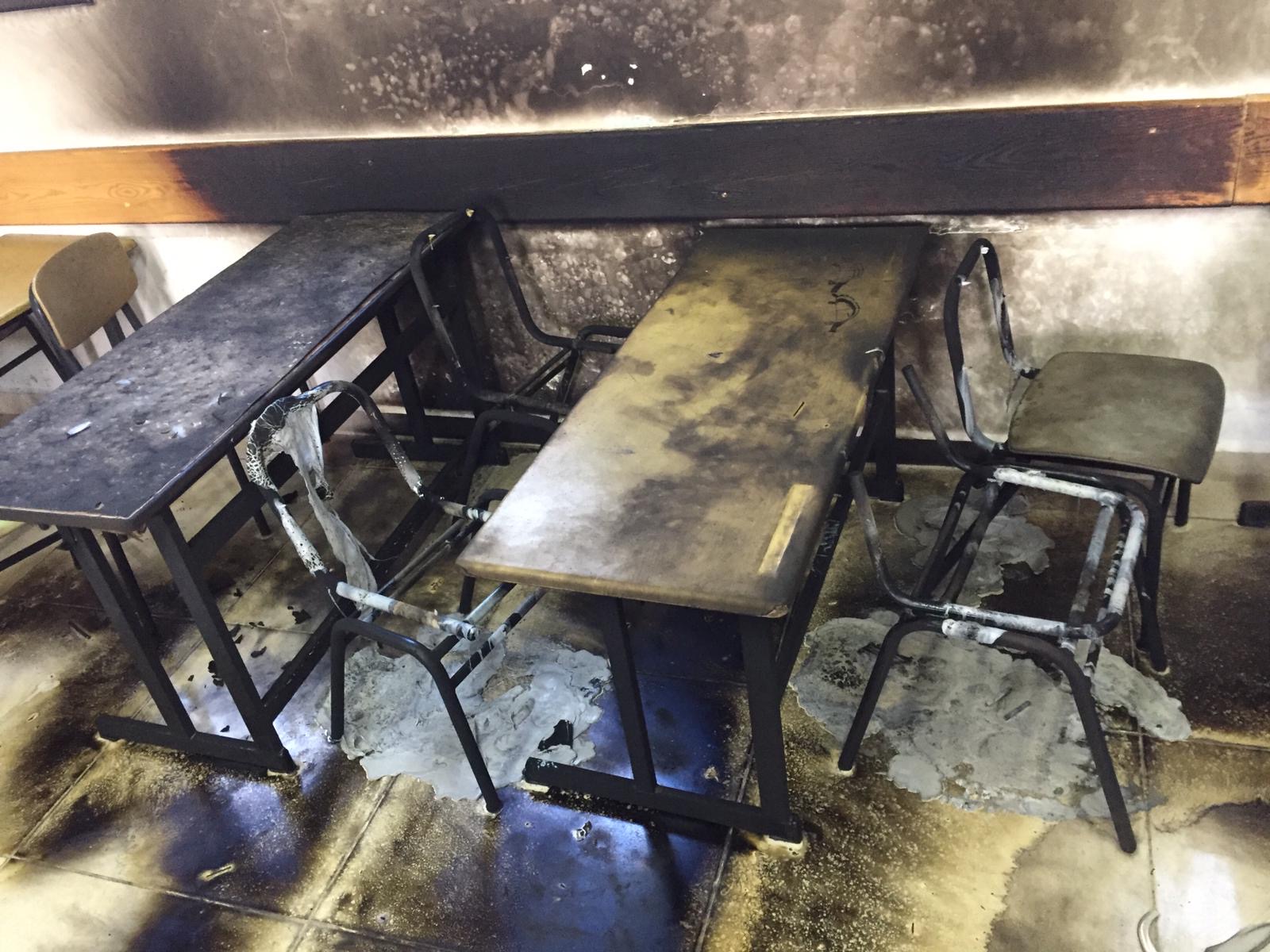Israeli settlers torch Palestinian school in latest 'price tag' attack

Israeli settlers set fire to a classroom last night in the occupied West Bank village of Einabus, in the latest apparent "price tag" attack on Palestinian communities, students and teachers told Middle East Eye.
Rateb Nassar, the deputy headmaster of the affected school, told MEE that Israeli settlers came from the nearby illegal settlement of Yitzhar, and threw burning materials inside one of the classrooms.
The assailants also spray-painted racist and anti-Arab slogans on the walls, threatening to kill Palestinians and burn their properties, he added.
“This is the most dangerous attack the school has witnessed, and it indicates that more settler attacks are to come," Nassar said.
“This attack caused a great deal of complication in the day's teaching, the teachers are nervous and the students are scared… Despite that we held classes as usual.”
Stay informed with MEE's newsletters
Sign up to get the latest alerts, insights and analysis, starting with Turkey Unpacked
'This is the most dangerous attack the school has witnessed, and it indicates that more settler attacks are to come'
- Rateb Nassar, deputy headmaster
“Price tag” attacks, in which Israeli settlers intimidate Palestinian communities through violence and vandalism, have become increasingly common in the West Bank. Israeli daily Haaretz reported that the number of reported incidents rose from 140 across all of 2017 to nearly 500 in 2018.
Last week, Israeli settlers torched a mosque and wrote racist anti-Arab slogans on its walls in the occupied East Jerusalem suburb of Sharafat village.
In addition to slashing car tyres and painting anti-Arab slogans, “price-tag” attacks often include assaults on Palestinians, the burning of properties and sacred places, and cutting down trees belonging to Palestinian farmers.
Fear and anxiety
Twenty-nine students use the classroom in Einabus, a village south of Nablus, which was left with torched furniture, smashed windows and black scorch marks up its walls.
Mohammed Azmi Hajja, a 10-year-old student, told MEE that he arrived at school on Tuesday morning ready to study, only to find his classroom a charred mess.
“Our day has been turned upside down into one of fear and anxiety… We were eager for the new English lesson,” Hajja, in the fifth grade, said.
“Our desks were burnt, and so were the paintings I had worked on and cost me a lot of money and effort. I am very sad for the loss."
Riad Shokokani, a teacher, told MEE that the attack had left everyone at the school on edge.
“As teachers we are trying to hide our stress, and we are trying to calm down the students and assure them that such attacks will not be repeated,” Shokokani said.
He added that these attacks directly impact the mental state of the children and that “it plays a role in encouraging students to drop out of school and not return”.
Palestinian Education Minister Naser Abu Karsh told Wafa news agency that “these settlers and occupation attacks will not scare the Palestinian people and will not stop the teaching process”, adding that the attack is not the first.
'As teachers we are trying to hide our stress, and we are trying to calm down the students and assure them that such attacks will not be repeated'
- Riad Shokokani, teacher
Nassar, the deputy headmaster, told MEE that in September 2019 Israeli settlers tried to attack the school while they ran riot in the village, prompting clashes and the intervention of Israeli forces.
Nassar said the local council of Einabus agreed last month to place mesh over the school's windows to protect it from such attacks. As well as the classrooms, there were many important documents in the headmaster's office that needed preservation, he added.
“But the school could not afford to put these on all the classroom windows… Also, the school will feel like a prison if we put such things on all the windows,” he said.
“The school should have roses and gardens around it, not fences on its windows, but we do not have any other choice after Israeli attacks.”
Eyad Awwad, director of Nablus's education department, told MEE that settlers wrote “Death to Arabs” and “Death to Murderers” on the school, signing the name “Uri” under it.
“This is a direct threat to kill, and incitement against the children who study there by calling them murderers,” Awwad said.
The Israeli army had not issued any statement regarding the incident at the time of publication.
Middle East Eye delivers independent and unrivalled coverage and analysis of the Middle East, North Africa and beyond. To learn more about republishing this content and the associated fees, please fill out this form. More about MEE can be found here.





